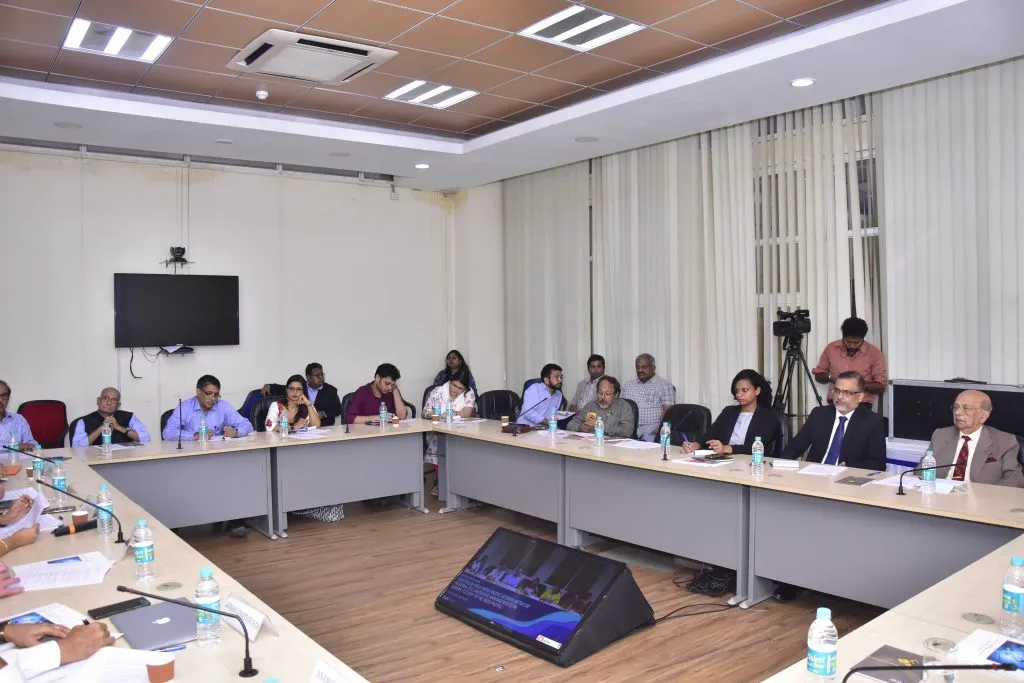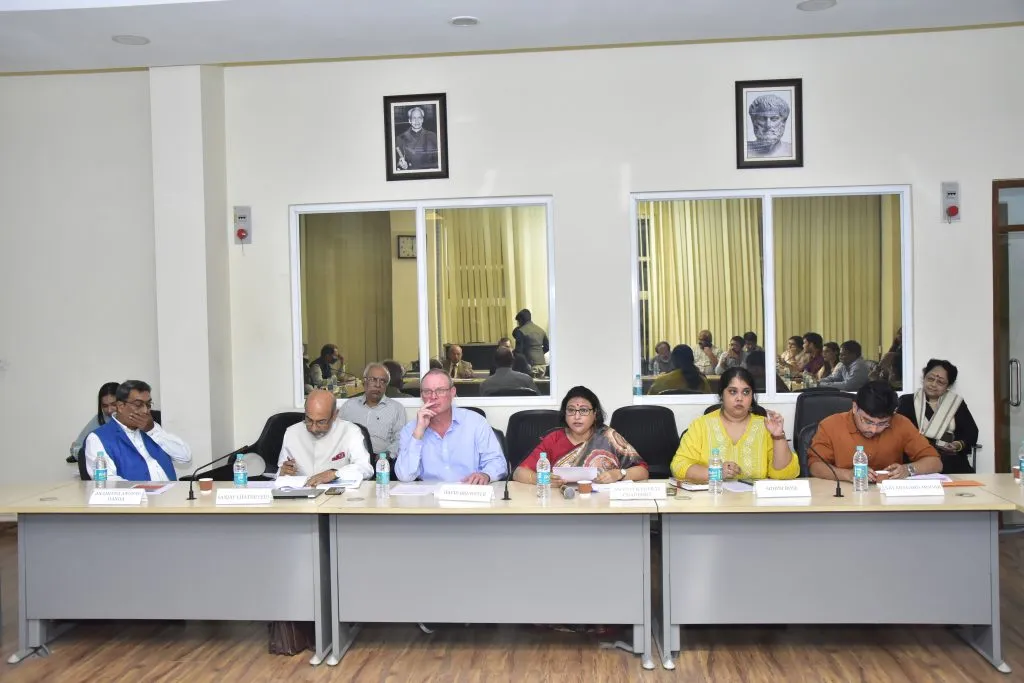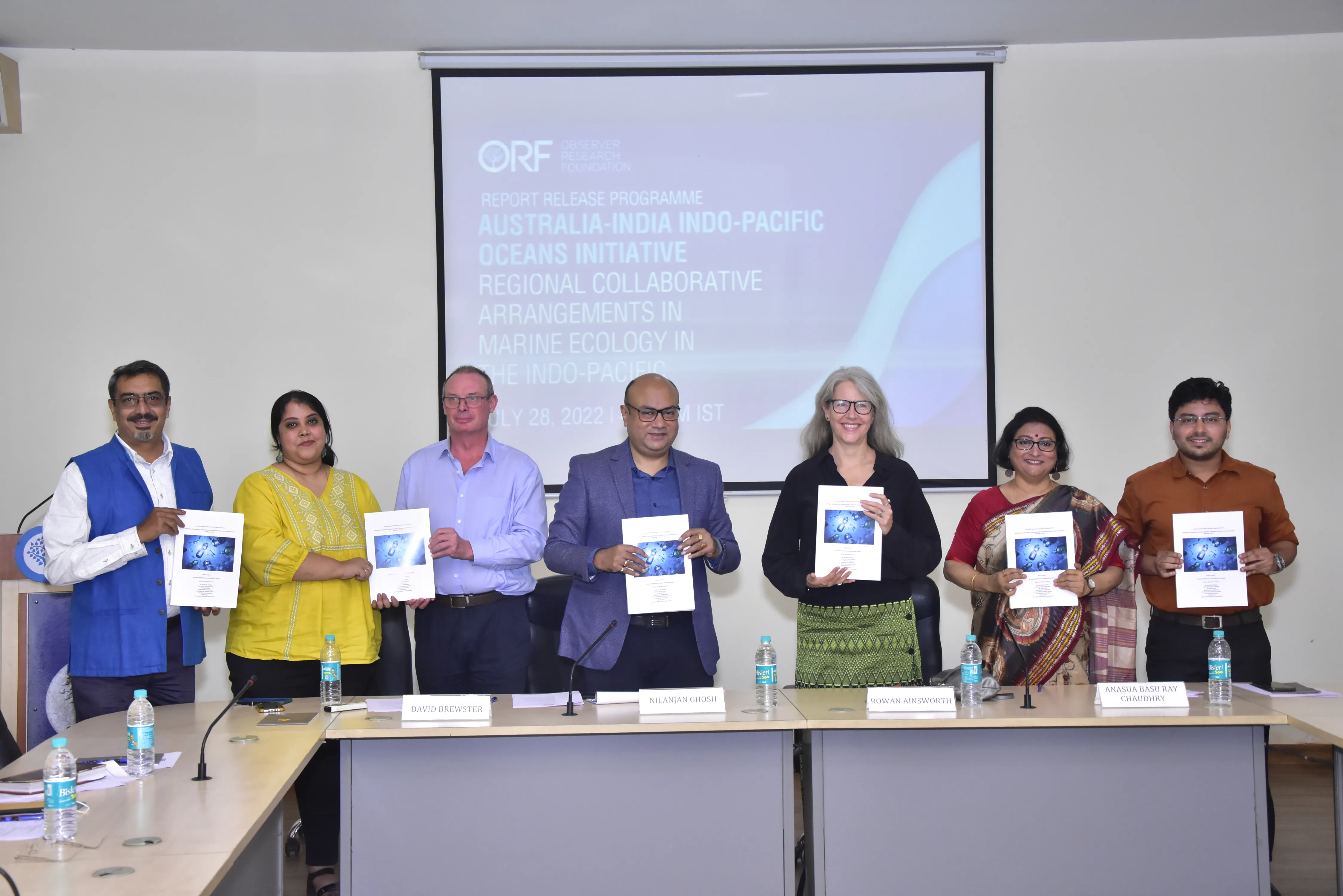Environmental and ecological challenges are increasingly growing in strength among the many non-traditional security threats manifest in the vast oceanic stretch of the Indo-Pacific region. These bear ramifications not only for the natural world, but also substantially impact socio-economic considerations, and even define strategic equations amongst countries. Accordingly, ‘Marine Ecology’ has been identified as one of the seven pillars in the India-led Indo-Pacific Ocean’s Initiative (IPOI), aiming to ensure the security and stability of the region’s maritime spaces. While several Indo-Pacific countries are collaborating with India in other areas of IPOI, such as security, infrastructure and resources, Australia has taken the lead in this domain.
In this context, a project supported by the Government of Australia on “Australia–India Indo-Pacific Oceans Initiative: Regional Collaborative Arrangements in Marine Ecology,” was undertaken by Observer Research Foundation, Kolkata, India and Nanyang Technological University, Singapore, under the direction of Dr David Brewster (Senior Research Fellow, Australian National University) and Dr Anthony Bergin (Senior Fellow, Australian Strategic Policy Institute) in July 2021. After a year of extensive research, this study culminated in a comprehensive report which was released through a Report Release Programme organised in hybrid mode by ORF Kolkata in collaboration with the Government of Australia on 28 July.

The report compiles a series of nine thorough baseline studies on regional arrangements in:
- The Pacific (marine plastics, IUU fishing and ocean science)
- Southeast Asia (marine plastics, emergency response and coastal conservation)
- The Bay of Bengal region (marine litter, IUU fishing and marine disaster management)
The reports relating to regional arrangements in the Pacific were researched and written by Dr Anthony Bergin, while reports concerning regional arrangements in Southeast Asia were prepared by a research team from the S. Rajaratnam School of International Studies (RSIS), Nanyang Technological University (NTU), Singapore. The team was headed by Dr Julius Cesar Trajano and included Dr Lina Gong and Margareth Sembiring. Reports relating to regional arrangements in the Bay of Bengal region were prepared by a research team from the Observer Research Foundation, Kolkata, India, which was headed by Dr Anasua Basu Ray Chaudhury and included Dr Anamitra Anurag Danda, Sayanangshu Modak and Sohini Bose.
The marine ecology report examines how Australia, India, and other Indo-Pacific partners may cooperate as part of the Indo-Pacific Oceans Initiative. The findings from these studies are the basis of a set of recommendations for the Australian Government to promote greater Indo-Pacific cooperation in the sphere.
The inaugural session of the Report Launch Programme chaired by Dr Nilanjan Ghosh, Director, ORF, Kolkata, was graced with an inaugural address by Her Excellency Sarah Storey, Deputy High Commissioner, Australian High Commission in New Delhi, India, and special addresses by Ms Chhimmy Pem, Director, BIMSTEC Sector on Environment & Climate Change and Ambassador Tariq Karim (Retd.), Director, Centre for Bay of Bengal Studies at Independent University, Bangladesh, respectively. The report was released by Ms Rowan Ainsworth, Consul General, Consulate General of Australia in Kolkata, India, after which Dr Brewster elaborated on the IPOI project, shedding light on how environmental and ecological concerns intertwine with the strategic milieu for nation-states.
The session was followed by a panel discussion on the central ideas discussed in the IPOI report. Moderated by Dr Brewster, the panel featured Dr Anasua Basu Ray Chaudhury, Dr Julius Cesar I. Trajano from the IPOI project along with leading experts such as Prof Sanjay Chaturvedi, Professor & Chairperson, Department of International Relations, South Asian University, New Delhi, and Nilanthi Samaranayake, Director, CNA's Strategy and Policy Analysis Program, Washington D.C., USA. The research teams from ORF and NTU also took part in the discussions.

The deliberations stressed distinctive maritime challenges, such as marine plastic, illegal unreported, and unregulated fishing, emergency response and marine disaster management. Regarding the problem of marine debris or the unscrupulous dumping of non-biodegradable waste into the seas, it was pointed out that for a practical resolution, an urban perspective of the oceans is necessary. Cities which lack proper waste management systems often contribute the most to ocean plastics. However, they can also be a major part of the solution through a multi-pronged approach that embeds the reduction of waste into the city’s developmental plans. Concerning IUU fishing, the requirement for more quantitative research for fish stock analysis was highlighted, especially in the Bay of Bengal region which suffers from a dearth of such frameworks. For disaster management, the issue of climate security and its implications were put forth. The need for a regional cooperative and collaborative mechanism was deemed necessary to address these threats, as such challenges are transnational. Such cooperation must, however, be gender-sensitive and take into account the existing inequalities and power asymmetries amongst involved countries, and also be considerate of the region’s specificities, to be truly effective. In conclusion, it was agreed that a key recommendation offered by the IPOI report, for the Australian Government to “sponsor an Indian Ocean environmental security Centre as a regional hub for professional development and research in environmental security,” must be implemented. After all, an Indo-Pacific region that is wealthy, secure and resilient requires a healthy marine ecology.
This report was written by Sohini Bose, Junior Fellow, ORF Kolkata with the help of Ashraf Nehal, Research Intern, ORF Kolkata.
The views expressed above belong to the author(s). ORF research and analyses now available on Telegram! Click here to access our curated content — blogs, longforms and interviews.

 The report compiles a series of nine thorough baseline studies on regional arrangements in:
The report compiles a series of nine thorough baseline studies on regional arrangements in:
 The deliberations stressed distinctive maritime challenges, such as marine plastic, illegal unreported, and unregulated fishing, emergency response and marine disaster management. Regarding the problem of marine debris or the unscrupulous dumping of non-biodegradable waste into the seas, it was pointed out that for a practical resolution, an urban perspective of the oceans is necessary. Cities which lack proper waste management systems often contribute the most to ocean plastics. However, they can also be a major part of the solution through a multi-pronged approach that embeds the reduction of waste into the city’s developmental plans. Concerning IUU fishing, the requirement for more quantitative research for fish stock analysis was highlighted, especially in the Bay of Bengal region which suffers from a dearth of such frameworks. For disaster management, the issue of climate security and its implications were put forth. The need for a regional cooperative and collaborative mechanism was deemed necessary to address these threats, as such challenges are transnational. Such cooperation must, however, be gender-sensitive and take into account the existing inequalities and power asymmetries amongst involved countries, and also be considerate of the region’s specificities, to be truly effective. In conclusion, it was agreed that a key recommendation offered by the IPOI report, for the Australian Government to “sponsor an Indian Ocean environmental security Centre as a regional hub for professional development and research in environmental security,” must be implemented. After all, an Indo-Pacific region that is wealthy, secure and resilient requires a healthy marine ecology.
The deliberations stressed distinctive maritime challenges, such as marine plastic, illegal unreported, and unregulated fishing, emergency response and marine disaster management. Regarding the problem of marine debris or the unscrupulous dumping of non-biodegradable waste into the seas, it was pointed out that for a practical resolution, an urban perspective of the oceans is necessary. Cities which lack proper waste management systems often contribute the most to ocean plastics. However, they can also be a major part of the solution through a multi-pronged approach that embeds the reduction of waste into the city’s developmental plans. Concerning IUU fishing, the requirement for more quantitative research for fish stock analysis was highlighted, especially in the Bay of Bengal region which suffers from a dearth of such frameworks. For disaster management, the issue of climate security and its implications were put forth. The need for a regional cooperative and collaborative mechanism was deemed necessary to address these threats, as such challenges are transnational. Such cooperation must, however, be gender-sensitive and take into account the existing inequalities and power asymmetries amongst involved countries, and also be considerate of the region’s specificities, to be truly effective. In conclusion, it was agreed that a key recommendation offered by the IPOI report, for the Australian Government to “sponsor an Indian Ocean environmental security Centre as a regional hub for professional development and research in environmental security,” must be implemented. After all, an Indo-Pacific region that is wealthy, secure and resilient requires a healthy marine ecology.